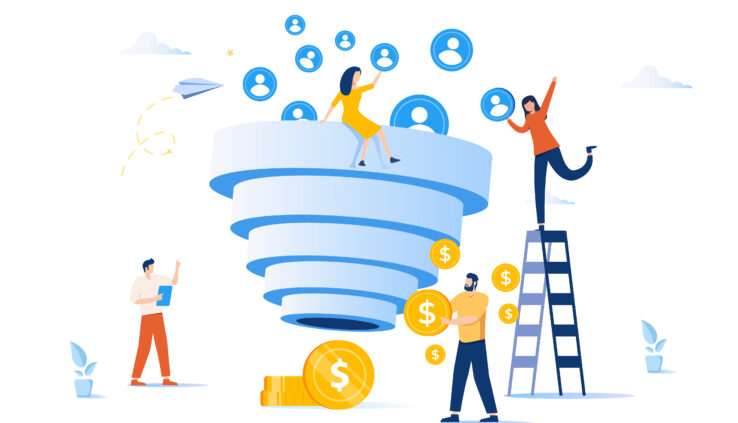E-commerce customer preferences and market trends are constantly shifting and the ability to make data-driven decisions can mean the difference between success and stagnation. One critical aspect of e-commerce optimization is the refinement of sales funnels, particularly on platforms like Shopify, which host a significant portion of online stores. By delving deep into data analytics and strategically utilizing insights, businesses can fine-tune their sales funnels to enhance customer experiences and boost conversions.
Understanding the Sales Funnel
The sales funnel is a conceptual framework that maps out the journey a potential customer takes from initial awareness of a product or service to the final purchase decision. Understanding each stage of the funnel is crucial for e-commerce businesses seeking to optimize their sales process and maximize revenue.
Key Components of a Sales Funnel:
- Awareness: This stage involves attracting the attention of potential customers and making them aware of your brand and offerings. Strategies for generating awareness include content marketing, social media advertising, and search engine optimization (SEO).
- Consideration: Once customers become aware of your brand, they enter the consideration stage, where they evaluate your products or services against competitors. Providing detailed product information, customer reviews, and comparison tools can help sway customers in your favour.
- Conversion: The conversion stage is where the actual purchase decision is made. Simplifying the checkout process, offering secure payment options, and providing incentives such as discounts or free shipping can help facilitate conversions.
- Retention: After making a purchase, retaining customers becomes essential for long-term success. Engaging customers through post-purchase communication, loyalty programs, and personalized recommendations can foster repeat purchases and brand loyalty.
The Role of Data in Optimization
Data lies at the heart of effective sales funnel optimization. By analyzing customer behaviour, preferences, and interactions at each stage of the funnel, businesses can identify areas for improvement and implement targeted strategies to enhance conversion rates and drive revenue growth.
Benefits of Data-Driven Decision Making:
- Identify Trends: Analyzing historical sales data can reveal patterns and trends in customer behaviour, product performance, and market demand. By identifying emerging trends, businesses can adapt their strategies to capitalize on new opportunities.
- Personalization: Leveraging customer data allows businesses to deliver personalized experiences tailored to individual preferences and behaviours. Personalized recommendations, targeted marketing campaigns, and customized product offerings can significantly enhance customer engagement and satisfaction.
- A/B Testing: Experimenting with different elements of the sales funnel through A/B testing enables businesses to determine which strategies are most effective in driving conversions. By testing variables such as website design, pricing strategies, and promotional offers, businesses can optimize their funnel for maximum effectiveness.
- Predictive Analytics: Advanced analytics techniques, such as predictive modelling and machine learning, can help businesses anticipate future trends and customer needs. By analyzing historical data and identifying patterns, businesses can make informed predictions about future demand, inventory requirements, and customer behaviour.
Optimizing the Shopify Sales Funnel
As one of the leading e-commerce platforms, Shopify offers a range of features and integrations designed to support data-driven decision-making and sales funnel optimization. From robust analytics tools to customizable marketing solutions, Shopify provides businesses with the resources they need to refine their sales funnel and drive sustainable growth.
Key Features for Optimization:
- Analytics Dashboard: Shopify’s built-in analytics dashboard provides businesses with valuable insights into key metrics such as website traffic, conversion rates, and sales performance. By monitoring these metrics, businesses can identify areas of improvement and track the impact of optimization efforts over time.
- Conversion Tracking: Setting up conversion tracking allows businesses to attribute sales and other valuable actions to specific marketing campaigns, channels, and sources. By understanding which campaigns are driving the most conversions, businesses can allocate their marketing resources more effectively and optimize their funnel accordingly.
- Customer Segmentation: Shopify enables businesses to segment customers based on demographic data, purchase history, and behavioural attributes. By segmenting customers into distinct groups, businesses can deliver targeted marketing messages and personalized experiences that resonate with individual preferences and interests.
- App Integrations: The Shopify App Store offers a wide range of third-party apps and integrations that extend the platform’s functionality. From email marketing automation to abandoned cart recovery and customer loyalty programs, these integrations provide businesses with additional tools to optimize their sales funnel and enhance the customer experience.
Data-driven decision-making is essential for optimizing e-commerce sales funnels and driving sustainable growth. By leveraging data analytics and the features available on platforms like Shopify, businesses can gain valuable insights into customer behaviour, identify opportunities for improvement, and implement strategies to increase conversions and revenue. With the right approach and technology stack in place, e-commerce entrepreneurs can stay ahead of the curve and achieve their business objectives.
Connect with geekspeak Commerce today to learn more about data-driven decision-making and how our team of experts can help you unlock the full potential of your e-commerce business.
